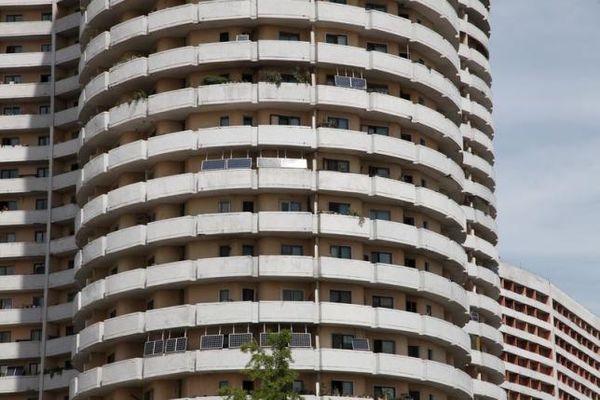In North Korea, solar panel boom gives power to the people
Date: 22-Apr-15
Country: SOUTH KOREA
Author: James Pearson

Solar panels face the sun from balconies of an apartment
building in Mangyongdae District, Pyongyang August 27, 2014.
Photo: REUTERS
In a country notorious for a lack of electricity, many North Koreans are taking power into their hands by installing cheap household solar panels to charge mobile phones and light up their homes.
Apartment blocks in Pyongyang and other cities are increasingly adorned with the panels, hung from balconies and windows, according to recent visitors to the isolated country and photographs obtained by Reuters.
"There must be at least a threefold increase in solar panels compared to last year," Simon Cockerell, who visits North Korea regularly as general manager of Beijing-based Koryo Tours, told Reuters from Pyongyang. "Some are domestically made, so that may have driven prices down."
North Korea has long suffered from electricity shortages which plunge large parts of the country into darkness, providing a stark contrast in night-time photos taken from space to prosperous and power-thirsty South Korea.
The soaring sales of cheap and easily-installed solar panels reflect rising demand for electricity in North Korea as incomes rise and people buy electronic goods like mobile phones and the "notel" media player that need regular charging. North Korea, one of the poorest countries in the world, is home to 2.5 million mobile phone users, about 10 percent of the population.
Once reserved for Workers' Party cadres, solar panels and voltage stabilizers are now sold openly both in markets and the hardware section of Pyongyang department stores, where small 20 watt panels cost just under 350,000 won - $44 at the widely-used black market exchange rate where a dollar is about 8,000 won, instead of the official 96 won.
Obtaining accurate data from North Korea is difficult, but roughly 10-15 percent of urban apartments in a series of recent photographs in North Korean cities obtained by Reuters appeared to have small solar panels attached to windows or balconies.
Whether that number translates nationally is unclear, but regular visitors have noted a significant increase in solar panel use across the country in recent months, either in urban areas or in one case in the backyard vegetable plot of a rural house.
MONEY IS POWER
Private solar panels are not illegal in authoritarian North Korea, where in recent years the government has tacitly allowed greater economic freedoms. However, some local authorities may demand a bribe for permission to install them, a defector said.
Electricity supply in North Korea is prioritized for factories or areas of political importance, but those with money or connections are often able to tap those lines illegally.
The country could be generating about 33 terawatt-hours of electricity a year, or just 7 percent of what South Korea generates, according to Tristan Webb, a former British Foreign Office analyst who visited North Korean power plants in 2013.
North Korea suffers from dry winters where Siberian winds can keep temperatures below freezing for months. The state exports much of its mined coal and relies heavily on hydro power, meaning electricity is in especially short supply in winter.
"We can heat our homes with a heater powered by a solar panel," said Kim Yeong-mi, a North Korean defector who came to the South in 2012.
Pyongyang is home to a solar panel factory, and state propaganda has said the technology is in "effective use" in solar-powered lamp posts in other cities. North Korea is trying to use renewable energy to "make up the shortage of electricity," state media said on Tuesday.
"Develop and make effective use of wind, tidal, geothermal and solar energy!," was one of a barrage of slogans released by the ruling party in February.
A typical solar power set-up includes a panel, battery, and inverter for charging phones or powering appliances. Private car ownership remains rare in North Korea, but car batteries are popular in households to store power for blackouts.
In the Chinese city of Dandong on the frontier with North Korea, large red signs outside shops advertise solar panel and battery kits, aimed at traders from across the border. At one shop, the largest set-up on sale produces enough power to run a TV, laptop, mobile phone, fridge, washing machine, rice cooker and even an electric blanket - all increasingly common household goods for moneyed North Koreans.
"North Koreans didn't really buy solar panels from us until two years ago," said Yang Yanmeng, a trader in China's Shandong province who has been selling solar panels since 2012.
"Now, up to 80-90 percent of our company's products are sold to North Koreans," he told Reuters by phone.
(Additional reporting by Seungyun Oh in SEOUL and Sue-Lin Wong in SHANGHAI; Editing by Tony Munroe and Raju Gopalakrishnan)
![]()
© Thomson Reuters 2015 All rights reserved